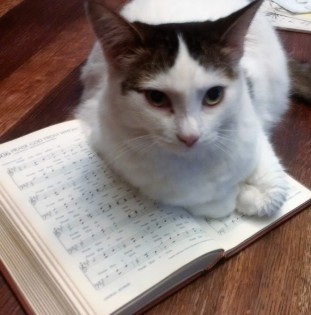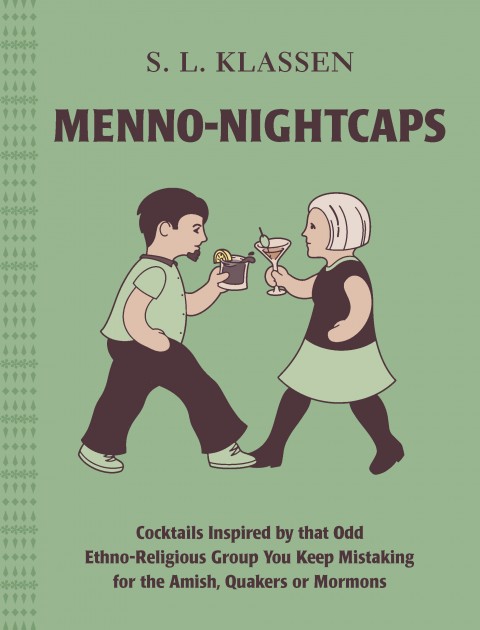 When I was eight years old, my older brother was baptized and joined our Mennonite Church. Moved by the ceremony, I went home and baptized the family dog.
When I was eight years old, my older brother was baptized and joined our Mennonite Church. Moved by the ceremony, I went home and baptized the family dog.
Mine was a shorter ceremony and I can’t say much about our pooch’s appreciation of the doctrine. But he was happy enough to participate in the rite.
I never considered baptizing my cat.
While my childhood biases clearly leaned towards dogs as the more Mennonite pet than cats, part of growing up means challenging our prejudices. I confess this realization has caused me a good deal of soul searching.
On the face of it, it is easy to imagine dogs the more Mennonite species. They are more community-oriented than cats. Yup, they’re probably more community-minded than the typical youth pastor. When given free rein, dogs choose to travel in packs, every bit like a convoy of Mennonites on their way to a relief sale or hymn sing. And, of course, domestic dogs are absolutely devoted to their human community. They don’t need to have known the epistles of St. Paul to long for a unity of spirit
Dogs are also hard working and service-oriented. They have an eagerness to please that would assure their willing participation in any Church or community events. I just can’t imagine a border collie saying no to a position on the Church Board or a golden retriever being slow to help with the dishes after a potluck. And, like I proved at age 8, dogs don’t say no to an adult baptism.
And yet.
Community is only one side of the Mennonite identity.
What of our long tradition of non-conformity? Readers of this blog already know that only a small percentage of all Mennonites live with restrictions on their dress and tech habits. But that doesn’t mean that the rest of us are passively conformist to the ways of the world. Different branches of the Mennonite Church just choose different parts of the “world” to not conform to, whether that means ascribing to unpopularly radical peace and nonviolence positions or to unsavory radical rightwing positions. It’s not that Mennonites have never been known to run with the pack — we just know enough to feel guilty about the times we have done that.
Dogs – not so much. They’re a little too happy to wag their tails and do what they’re told.
Cats, on the other hand, are all over non-conformity. Cats are firm in their beliefs (or habits) and are reluctant to sway from their principles just because others around them are advocating something else. Even if the winds of war raged all around them, cats would twitch their tails and obstinately ignore propaganda aimed at persuading them that their allies and enemies were any different than they already knew.
While it must be admitted that neither cats nor dogs are nonviolent by nature or choice, cats are decidedly less likely to be conscripted into the armed forces. This might not count as an adherence to pacifism by most modern standards but it is certainly as close to it as has been the case by some branches of our Church at some points in history. In their refusal to be trained, cats are the conscientious objectors of the companion animal world.
Cats know their own minds; in that, they are not unlike the vast majority of attendees of your average Mennonite congregational meeting. If dogs long for a unity of purpose without having to be told, cats are notorious for their inability to stay together as a group. Hmm – sound familiar? It is true that cats are more likely to go off in a million different directions than to splinter and start their own new schismatic group but they definitely represent our spirit of disunity far more accurately than their canine counterparts.
Anyone who has lived with both dogs and cats knows that dogs are quicker to forgive than cats. Which sounds nice but isn’t all that is asked of us. Like many a Mennonite congregation, cats will shun humans who are guilty of sin (though failing to clean the litter box is not listed as a sin in the Bible, we can’t expect it to have covered everything). Cats understand the importance of holding their loved ones accountable for their actions, and use avoidance as a form of discipline.
When confronted with their own sins, dogs are far more inclined to cower and beg forgiveness than cats. While many branches of the Mennonite Church favour this response in theory, it isn’t really the option that most of us choose in practice. More in the habit of identifying the sins of others, we have the persistence of a dog with a bone or a cat at a mouse hole when it comes to identifying others’ errors in the letters to the editor pages of the Canadian Mennonite (I’m assuming that Mennonites in other parts of the world have their own corresponding venues for their own persistent disputations).
If cats and dogs are equally representative of our persistence, they are also equally un-Mennonite in a number of key areas. Neither, for instance, are up to our standards in choral performance. Though both are willing to vocalize and make noises that could be considered attempts at singing, as species, they are both unskilled at the four-part harmony required for hymn singing, or even the unison singing expected of worship songs.
Likewise, neither dogs nor cats could be expected to behave at a potluck – dogs are too likely to butt to the front of the line and leave nothing for those behind them, and cats are too likely to reject all the food options on offer. Nor would they thrive through a long worship service. Dogs could be trained to sit but it is fair to assume that their attention would not be focused on the sermon but instead on whatever aromas are emanating from the kitchen. And cats would wander around at will or fall asleep in a sunbeam.
While frugality is close to a tenet of faith for many a Mennonite, it’s hard to imagine either pet as a more-with-less kind of creature. On the one hand, cats make their meal (or mouse) last and save for later needs. On the other hand, dogs finish everything on their plates without needing to be told about the sin of waste. But that’s where their frugality ends. Neither will respect a human’s desire to save wrapping paper for future use or re-use their Styrofoam meat trays.
Those Mennonites who purport that the term Mennonite ought never to refer to cultural or ethnic markers will be pleased to note that both cats and dogs are indifferent to the distinctions between us. They don’t appear to have opinions regarding either farmer’s sausage or scrapple and are equally conversant in Plautdeutsch and Pennsylvania Dutch (and all the other languages that Mennonites speak). Both animals like quilts. Neither are any good at dancing.
It is perhaps this flexibility that has kept Mennonites from ever schismatizing over our preferences for dogs or cats. While I suspect that many of the more rural Mennonites maintain a less sentimental attitude towards both cats and dogs than those of us in the cities, we have all managed to have dog lovers and cat aficionados worship together in the same congregations in relative harmony for years.
Which can be seen as something of an accomplishment.
The Pets of Faith
The cocktail world is sadly divided over dogs and cats – with recommendations for dog lovers and recommendations for cat lovers but an absence of cocktails for those of us who wish to honour both and maintain harmony between the friends of both.
Because a lot of dogs and cats are fuzzy, I have made a bit more of a grown-up version of the fuzzy navel. Also, peaches are in season now.
- 1 1/2 oz gin
- 1 1/2 oz peach puree syrup*
- 1 oz orange juice
- 2 oz fizzy water
Stir together the first three ingredients. Add the fizzy water and serve over ice in a tall glass with peach slices. Garnish with a cherry if you like, or just more peaches.
Drink with a cat on your lap or a dog at your feet. Or both.
* Make peach puree syrup by cooking up some peach in equal amounts of sugar and water. Use a quarter of a peach for a quarter cup of sugar and water.



Cat’s can not be baptized therefore they are not Mennonite. They can be tested with water like Salem witches but not baptized. One needs to participate willingly with a confession of faith to be baptized. No such thing has ever happened in the feline world.